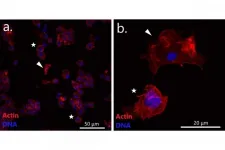(Press-News.org) Researchers at the Johns Hopkins Kimmel Cancer Center used machine learning techniques to detect mutational signatures in cancer patients. Their algorithm outperformed the current standard of analysis and revealed new mutational signatures associated with obesity, which is believed by cancer prevention experts to be becoming the most significant lifestyle factor contributing to cancer in the U.S. and most of the Western world.
The study was published in the Jan. 25 issue of the journal eLife.
"Mutational signatures are important in current cancer research as they enable you to see the signs left by underlying factors, such as aging, smoking, alcohol use, UV exposure, and BRCA inherited mutations that contribute to the development of a cancer," says study leader, Cristian Tomasetti, Ph.D., associate professor of oncology at the Johns Hopkins Kimmel Cancer Center, with a joint appointment in Biostatistics at the Johns Hopkins Bloomberg School of Public Health.
The new technique uses an application of artificial intelligence called machine learning, via a computer algorithm that accesses and analyzes data to uncover what they call SuperSigs, which are mutational signatures that reveal the genetic effects of the underlying contributors to cancer. Their algorithm is classified as "supervised" because it is an analysis that includes known exposures during the training of the algorithm for the genetic analysis of a cancer. The most widely used mutational signatures used for assessing genomic data are classified as "unsupervised" because they do not take known exposures into consideration. Instead, it notes patterns and then goes back to correlate them with exposures. The new method also allows for a mix of supervised and unsupervised approaches, controlling or blocking out the effect of known exposures to carcinogens to explore the possible effect of potential unknown factors.
The researchers found that the new supervised technique outperformed the unsupervised methodology in terms of prediction accuracy. The supervised methodology had a median area under the curve (AUC) of 0.73 for aging and 0.90 for all other factors, while the unsupervised methodology had a median AUC of 0.57 for aging and 0.77 for all other factors.
"A 0.5 or below AUC means the method is not better than pure chance. The highest value you can get is 1," says first author Bahman Afsari, Ph.D., an instructor at the Johns Hopkins Kimmel Cancer until a few months before publication.
They also revealed what they believe are the first mutational signatures associated with cancers of obese patients, providing evidence for a mutational mechanism related to obesity and the origination of cancers.
"Obesity is arguably the most important lifestyle factor contributing to cancer, but its mechanism for causing cancer has been unknown," says Tomasetti. "As cancers of obese patients often do not appear to have an increased number of mutations, it was thought that the mechanism through which obesity increases cancer risk was not via mutations. Our results show that it is, at least in part, mutational."
Their method also showed that an etiological, or underlying, factor does not always cause the same mutational effect on all tissues, a discovery that was contrary to assumptions of the unsupervised methodology.
"Aging yields different mutational signatures in different tissues, and so do smoking and several other environmental exposures," says co-first author Albert Kuo, Ph.D. candidate at the Johns Hopkins Bloomberg School of Public Health. "Also, in lungs, the signature for aging and the signature for smoking are very different, but in other tissues, the signature of smoking is relatively similar to the signature for aging, suggesting inflammation as the main mechanism."
Additionally, the research provided validation for the key role of random mutations--normal mistakes occurring within the DNA of cells during replication--in the development of a cancer.
"Every time a cell divides, it has to duplicate its DNA. As the duplication and repair machinery copies the billions of letters--the molecules that make up our DNA--mistakes are made. It is estimated that there are between three to six DNA mutations occurring every time a cell divides," explains Tomasetti. "A major source of the mutations that cause cancer appears to be these endogenous processes that have nothing to do with genetic defective genes or harmful exposures."
Through the algorithm, Tomasetti and team determined that 69% of the mutations found in cancer patients across all tumor types can be attributed to randomly occurring mutations, pointing to a need for a greater focus of effort and resources on early detection, he says.
"If we can't avoid cancer from occurring, then the next best thing is to find it before it is too late. If we can find a cancer at an early stage, then typically, you can save the life of the patient," he says.
INFORMATION:
In addition to Tomasetti, Afsari, and Kuo, the Johns Hopkins team of researchers included Bert Vogelstein, M.D., YiFan Zhang, Lu Li, Ph.D., Kamel Lahouel, Ph.D., Ludmila Danilova, Ph.D., Alexander Favorov, Ph.D., Leslie Cope, Ph.D., and Ken Kinzler, Ph.D. Other participating researchers included Arthur Grollman, M.D., from State University of New York at Stony Brook.
Making people fear the coronavirus may motivate us to wash our hands, keep our distance and wear a face mask. But fear also takes a heavy toll on our mental health and is fertile ground for discrimination and prejudice. New research shows a different path.
When the coronavirus pandemic hit the world in the spring of 2020, feelings of being capable or efficacious against the virus were a key factor in driving compliance with the authorities' guidelines. This is the result of a new study based on large surveys across eight Western democracies, published in British Journal of Health Psychology.
The extent to which we personally felt informed and capable of acting clearly affected the extent of our behaviour to prevent infection, e.g. by keeping our distance ...
A team of researchers at the Technical University of Munich (TUM) has developed a new early warning system for vehicles that uses artificial intelligence to learn from thousands of real traffic situations. A study of the system was carried out in cooperation with the BMW Group. The results show that, if used in today's self-driving vehicles, it can warn seven seconds in advance against potentially critical situations that the cars cannot handle alone - with over 85% accuracy.
To make self-driving cars safe in the future, development efforts often rely on sophisticated models aimed at giving cars the ability to analyze the behavior of all traffic participants. But what happens if the models are not yet capable of handling some complex ...
Drinking beetroot juice promotes a mix of mouth bacteria associated with healthier blood vessels and brain function, according to a new study of people aged 70-80.
Beetroot - and other foods including lettuce, spinach and celery - are rich in inorganic nitrate, and many oral bacteria play a role in turning nitrate to nitric oxide, which helps to regulate blood vessels and neurotransmission (chemical messages in the brain).
Older people tend to have lower nitric oxide production, and this is associated with poorer vascular (blood vessel) and cognitive (brain) health.
In the new study, by the University of Exeter, 26 healthy older people took part in two ten-day supplementation periods: one with nitrate-rich ...
Increasing numbers of people in Belgium are turning away from meat in favour of plant-based alternatives, according to new research from psychologists at the University of Bath, in collaboration with Belgian animal welfare organisation GAIA.
New analysis finds that in 2020, over half of Belgians (51%) were 'satisfied' with meat alternatives - a figure that has increased from 44% since 2019.
The results of the research which gauged responses from a representative sample of 1,000 people in Belgium over two years (in 2019 and 2020) highlights concerns around animal agriculture and the environment that are impacting individuals' dietary choices.
Additional findings from ...
Computer scientists at the University of Surrey have created a ground-breaking model that could improve our understanding of developmental disorders such as autism.
Scientists have long tried to better understand how the cerebral cortex and its layers develop, with pathologies such as autism, schizophrenia and epilepsy linked to this process.
In a paper published by the journal Cerebral Cortex, scientists from Surrey, Newcastle University, and Nottingham University detail how they developed and used a computational model to simulate cell division, cell migration and apoptosis (cell death) in the hope of understanding how these processes affect the development of the brain.
With the help of their computer model, the ...
A study examining bean productivity among smallholder farmers in Tanzania, has found that on average, yields are 6% lower among female than male farmers. Women are often 'invisible' in agriculture, researchers say, due to social structural barriers and national agricultural policies, which do not address discriminatory land rights; education and agricultural information and decision making, which must be tackled to reverse this trend.
The paper 'What Does Gender Yield Gap Tell Us about Smallholder Farming in Developing Countries?' published in the open access scientific journal Multidisciplinary Digital Publishing (MDPI), analyzed data from southern region in Tanzania since 2016 and also drew on research ...
'A transmissible cancer was first discovered in dogs in the middle of the 19th century. It is transmitted sexually from a sick dog to a healthy one, the cancer cells themselves being the infective agent. In the 1990s, a contagious cancer was discovered in the Tasmanian devil. Since the cancer was found in only two species of mammals, scientists used to think that it is quite rare in the nature. However, time has come to reconsider this view. A transmissible cancer appears to be fairly widespread among bivalve molluscs,' says Maria Skazina, a research associate at the ...
DALLAS - March 30, 2021 - UT Southwestern researchers have identified factors that put patients with childhood-onset lupus at elevated risk for poor outcomes, such as end-stage renal disease or death, as they transition from pediatric to adult health care. The findings, published online in Seminars in Arthritis and Rheumatism, emphasize the precarious nature of this period and shine a spotlight on areas prime for intervention to help protect these vulnerable patients.
Patients with chronic diseases that used to be fatal early in life now often survive to live long lives. However, says study senior author END ...
Babies can recognise combinations of words even before they have uttered their first word, a study suggests, challenging ideas of how children learn language.
Assessments in 11-12 month-olds show that infants at the cusp of talking are already processing multiword phrases such as 'clap your hands'.
Researchers say the study is the first to provide evidence that young children can pick up and understand multiword sequences before they can talk or begin producing such combinations themselves.
The findings suggest that babies learn individual words and more complex phrases at the same time, which challenges the perspective that they progress from single words to phrases and sentences, experts say.
It may also explain why adults who learn a new language in later life ...
The first online advertisement was a banner for AT&T that appeared on the HotWired.com website in 1994, when there were just 30 million internet users worldwide. Today, 57% of the world's population has access to the internet and advertising technology has advanced to the point that by 2018 the digital advertising market in Europe alone was worth 55 billion euros. Of this amount, 16.8 billion euros is accounted for by programmatic advertising, which uses artificial intelligence to automate much of the buying and selling of internet advertising.
A new report, published by Open Evidence, a ...



